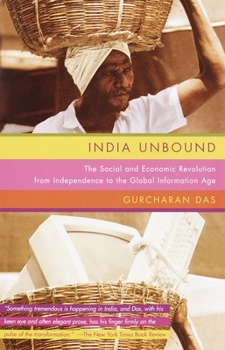India Unbound: The Social and Economic Revolution from Independence to the Global Information Age
Select Format
Select Condition 
Book Overview
India today is a vibrant free-market democracy, a nation well on its way to overcoming decades of widespread poverty. The nation's rise is one of the great international stories of the late twentieth... This description may be from another edition of this product.
Format:Paperback
Language:English
ISBN:0385720742
ISBN13:9780385720748
Release Date:April 2002
Publisher:Knopf Doubleday Publishing Group
Length:432 Pages
Weight:0.75 lbs.
Dimensions:1.0" x 5.2" x 8.0"
Customer Reviews
5 ratings
How Capitalism Jump-started India's Economy
Published by Thriftbooks.com User , 16 years ago
Ever wonder how India changed from an impoverished and allegedly over populated third world country to the rising economy that it is today? If so, this is the book for you. India Unbound is a history of post-WWII India with a heavy emphasis on political economy. This is an excellent read for fans of free market capitalism. This book contains a lot of facts, which further illustrate how genuine pro-capitalist reforms allow a nation (not just a western nation) to flourish. After its independence in 1947, India's first prime minister Jawaharlal Nehru decided to impose a planned economy on India. The elaborate system of licenses, regulations and red tape which ensued was known as the License Raj. India's economy did not really show any upward trends until it underwent market liberalization and provided incentives for direct foreign investment, initially under Prime Minister Rajeev Gandhi in the late 1980s and more comprehensively under Prime Minister Rao in 1991. However, the true architect of India's economic reform program was Manmohan Singh. Singh is the current Prime Minister of India and was Rao's handpicked finance minister in Rao's Cabinet. He is also has a Ph.D. in economics from Oxford University. Singh's influence is decently documented in India Unbound. My only complaints about this book are pretty minor. In particular, I think that Gurcharan Das is wrong in his assessment on John Rawls. Das attributes the ideas of Rawls as supportive of market liberalization since Das perceives Rawls as giving moral justification to income inequality (within certain restrictions). Although they might encourage a more liberal economy than India had before the dismantling of the License Raj, the ideas of Rawls, which argue for welfare redistribution in the name of social justice, are hardly a sound basis for capitalism. However, to be clear, Das only mentions Rawls for a few pages.
The Best commentary about India ever
Published by Thriftbooks.com User , 21 years ago
This is one of the few honest commentaries on India, its economy, culture, past and present.This books explains you truely (as Author's experinces) about "License Raj". The books clearly documents damage done by "Socialist" policies of Indian Government. The book also documents the price paid by all of the Indians for the economic experiment of communist command driven economy in democratic country.The book is nicely written, some times one may feel that author has some serious grudge against Pandit Nehru. Personally I understand the sentiment. The best book even written about India,
The Indian economy - Explained
Published by Thriftbooks.com User , 22 years ago
This book covers India over a broad enough frame of time .. the last 50 years since Independence. Since the author has worked in industry .. his views have a practical perspective. It also throws light on doyens of Indian industry the Birlas, the Tatas , the Amabanis.. and their efforts to power growth and simultaneously battle the bureaucracy.The author has made a convincing attempt at pointing out the ills of bureaucracy and licensing .. and their effects in keeping economic growth down.The book makes good reading , an understanding of fundamental economics is unnecessary and anyone who has an interest in India should find this book a very good read .
Highly Recommended!
Published by Thriftbooks.com User , 23 years ago
India's recent leadership in information technology and software design is just one facet of the country's economic transformation and re-birth. Journalist, former CEO and Harvard graduate, Gurcharan Das was born in India shortly before its independence. He moved to the United States in the 1950s, then returned to India as a marketing executive. Das deftly weaves history, cultural commentary and astute economic insight into a page-turning tale, and then brings it to life with the connective tissue of his personal story. We [...] were spellbound by his splendid book, which details India's emergence into the global economy, while delving deeply into why it took the country so long to come into its own.
About Indian economy and its potential
Published by Thriftbooks.com User , 23 years ago
This is a very informative book (and a thrilling one for every Indian) on the current state of Indian economy, what policies and factors shaped it and what can be made of it in the new century. The book blends government policy details of the past half a century (of independence) with interesting anecdotes of successful businessmen. The author is a strong advocate of free market policies and comes down heavily on Nehruvian thinking. The statistics and facts that are presented to support his reasoning are compelling.After reading this book, one would tend to see a lot of mistakes in Nehru's view of modern India. The book squarely blames Indira Gandhi for most of the damage done to the system, citing the nationalization of banks and enactment of laws thwarting entrepreneurship. Overall, the book is very positive in what the new millenium holds for India. It presents a glowing future in the face of the recent economic liberalization. A must read to catch up with post-independence Indian economy.





